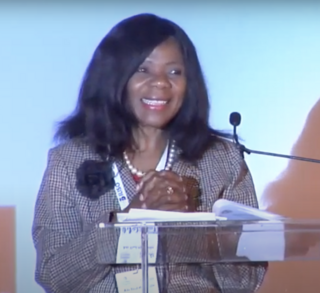Related Research Articles

The Truth and Reconciliation Commission (TRC) was a court-like restorative justice body assembled in South Africa in 1996 after the end of apartheid. Authorised by Nelson Mandela and chaired by Desmond Tutu, the commission invited witnesses who were identified as victims of gross human rights violations to give statements about their experiences, and selected some for public hearings. Perpetrators of violence could also give testimony and request amnesty from both civil and criminal prosecution.

The South African Broadcasting Corporation (SABC) is the public broadcaster in South Africa, and provides 19 radio stations (AM/FM) as well as six television broadcasts to the general public. It is one of the largest of South Africa's state-owned enterprises.

The Population Registration Act of 1950 required that each inhabitant of South Africa be classified and registered in accordance with their racial characteristics as part of the system of apartheid.

Lesbian, gay, bisexual, transgender, and queer (LGBTQ) people in South Africa have the same legal rights as non-LGBTQ people. South Africa has a complex and diverse history regarding the human rights of LGBTQ people. The legal and social status of between 400,000 to over 2 million lesbian, gay, bisexual, transgender and intersex South Africans has been influenced by a combination of traditional South African morals, colonialism, and the lingering effects of apartheid and the human rights movement that contributed to its abolition.
Disabled Peoples' International (DPI) is a cross disability, consumer controlled international non-governmental organization (INGO) headquartered in Ottawa, Ontario, Canada, and with regional offices in Asia-Pacific, the Middle East, Europe, Africa, Latin America, and North America and the Caribbean. DPI is a network of national organizations or assemblies of disabled people, established in 1980–81 to promote the human rights of disabled people through full participation, equalization of opportunity and development. DPI assists organisations in over 152 nations with the day to day issues of helping disabled people. They also host assemblies and symposiums across the world with their different national branches.
Human rights in South Africa are protected under the constitution. The 1998 Human Rights report by Myles Nadioo noted that the government generally respected the rights of the citizens; however, there were concerns over the use of force by law enforcement, legal proceedings and discrimination. The Human Rights Commission is mandated by the South African Constitution and the Human Rights Commission Act of 1994, to monitor, both pro-actively and by way of complaints brought before it, violations of human rights and seeking redress for such violations. It also has an educational role.
There have been many political assassinations in post-apartheid South Africa. In 2013 it was reported that there had been more than 450 political assassinations in the province of KwaZulu-Natal since the end of apartheid in 1994. In July 2013 the Daily Maverick reported that there had been "59 political murders in the last five years". In August 2016 it was reported that there had been at least twenty political assassinations in the run up to the local government elections on the 3rd of August that year, most of them in KwaZulu-Natal.

Thulisile Nomkhosi "Thuli" Madonsela is a South African advocate and professor of law, holding a chair in social justice at Stellenbosch University since January 2018. She served as the Public Protector of South Africa from 19 October 2009 to 14 October 2016. In 1996, she helped draft the final constitution of South Africa promulgated by then-President Nelson Mandela.
The world's poor are significantly more likely to have or incur a disability within their lifetime compared to more financially privileged populations. The rate of disability within impoverished nations is notably higher than that found in more developed countries. Since the early 2010s there has been growing research in support of an association between disability and poverty and of a cycle by which poverty and disability are mutually reinforcing. Physical, cognitive, mental, emotional, sensory, or developmental impairments independently or in tandem with one another may increase one's likelihood of becoming impoverished, while living in poverty may increase one's potential of having or acquiring disability in some capacity.
Disability in China is common, and according to the United Nations, approximately 83 million people in China are estimated to have a disability.
Reliable information about disability in North Korea, like other information about social conditions in the country, is difficult to find. As of 2016, North Korea is a signatory to the United Nations Convention on the Rights of Persons with Disabilities.
Peruvians with disabilities constitute 5.2% of the population. 52.1% of disabled people are women. 40.5% of disabled Peruvians have a primary or better education. 76.8% are not economically active they have an unemployment rate of 12.1%. Of those Peruvians with disabilities who do work, 58.3% are self-employed.
Disability affects many people in Zimbabwe in both rural and urban areas. In spite of services provided by the government, philanthropists and welfare agencies, people with disabilities and their families often face several barriers. Philanthropist, Jairos Jiri, started services for people with disability in Zimbabwe in the 1940s. He is regarded as the father or founder of disability work in Zimbabwe.

Singapore does not have a formal definition of disability. Singapore signed on to the Convention on the Rights of Persons with Disabilities in 2013 and coordinates the Enabling Masterplan with both government and non governmental organisations.
Hendrietta Ipeleng Bogopane-Zulu is a South African politician and activist who is currently serving as Deputy Minister of Social Development since 26 May 2014. She represented the African National Congress (ANC) in the National Assembly from 1999 to 2019.

Approximately 12 million French citizens are affected by disability. The history of disability activism in France dates back to the French Revolution when the national obligation to help disabled citizens was recognized, but it was "unclear whether or not such assistance should be public or private." Disabled civilians began to form the first associations to demand equal rights and integration in the workforce after the First World War. Between 1940 and 1945, 45,000 people with intellectual disabilities died from neglect in French psychiatric asylums. After the Second World War, parents of disabled children and charities created specialized institutions for disabled children for whom school was not accessible. In 2018, the French Government began to roll out a disability policy which aimed to increase the allowance for disabled adults to €900 per month, improve the digital accessibility of public services, and develop easy-to-read and understand language among other goals.
Estimates of the prevalence of disability in Egypt have ranged from 1.8% to 11%. Egypt ratified the United Nations Convention on the Rights of Persons with Disabilities on 10 April 2008. The Egyptian constitution of 2014 guarantees a range of rights for people with disabilities, and Egypt passed legislation entitled the Law on the Rights of Persons with Disabilities in February 2018.
South Africa has one of the most extensive social welfare systems among developing countries in the world. In 2019, an estimated 18 million people received some form of social grant provided by the government.
Andrew Frans Madella is a South African politician, disability rights activist, and former trade unionist. A member of the African National Congress (ANC), he served the Western Cape constituency in the National Assembly from 2005 to 2009 and from 2014 to 2019.
References
- ↑ Census 2011: Profile of persons with disabilities in South Africa (PDF) (Report). Pretoria: Statistics South Africa. 2014. ISBN 9780621427936.
- ↑ "2.9 million South Africans are disabled: Stats SA". Times Live. South African Press Association. 9 September 2014. Archived from the original on 11 October 2014. Retrieved 6 October 2014.
- ↑ Wakefield, Adam (9 September 2014). "Mining may contribute to disability levels". IOL News. SAPA. Archived from the original on 10 October 2014. Retrieved 6 October 2014.
- ↑ "UNTC - Convention on the Rights of Persons with Disabilities". United Nations. Retrieved 30 September 2014.
- ↑ "UNTC - Optional Protocol to the Convention on the Rights of Persons with Disabilities". United Nations. Archived from the original on 13 January 2016. Retrieved 30 September 2014.
- ↑ "South Africa's Integrated National Disability Strategy" . Retrieved 30 September 2014.
- ↑ "Minister & Department of Women, Children and People with Disabilities on its Annual Report for 2012/13". Parliamentary Monitoring Group. Retrieved 30 September 2014.
- ↑ "President Zuma considers concerns from disability activists" (Press release). The Presidency of the Republic of South Africa. 27 June 2014. Archived from the original on 7 October 2014. Retrieved 30 September 2014.
- ↑ "Zuma taking disability rights '10 steps backwards'". Times Live. SAPA. 13 June 2014. Archived from the original on 17 June 2014. Retrieved 6 October 2014.
- ↑ Department of Social Development (2015-12-08). "White Paper on the Rights of Persons with Disabilities" (PDF). Government of South Africa: 38. Retrieved 2017-08-17.
{{cite journal}}: Cite journal requires|journal=(help) - ↑ "QASA Mission & Vision". QuadPara Association of South Africa. Retrieved 7 October 2014.
- ↑ Watermeyer, Brian (19 September 2013). "Silencing lives of struggle: how Disabled People South Africa has sacrificed the politics of protest". Daily Maverick. Retrieved 30 September 2014.
- ↑ Colleen, Howell; Chalklen, Schuaib; Alberts, Thomas (2006). "A History of the Disability Rights Movement in South Africa". In Brian Watermeyer (ed.). Disability and social change: a South African agenda. Cape Town: HSRC press. p. 51. ISBN 9780796921376.
- ↑ Nair, Nivashni. "Disabled parking gets hotline". Times Live. Archived from the original on 26 July 2014. Retrieved 6 October 2014.
- ↑ Reitumetse Pitso; Khulekani Maguban. "South Africa failing the disabled". BDLive. Archived from the original on 6 July 2014. Retrieved 6 October 2014.
- ↑ World report on disability (PDF), World Health Organization, 2011, p. 70, ISBN 9789240685215
- ↑ "Disability Grant". South African Social Security Agency. Retrieved 30 September 2014.
- 1 2 Taylor, Theresa (12 June 2014). "Findings show vulnerability of disabled". IOL News. The Star. Archived from the original on 10 October 2014. Retrieved 7 October 2014.
- ↑ "Disabled living in poverty - study". News24. SAPA. 14 May 2010. Archived from the original on 12 October 2014. Retrieved 7 October 2014.
- ↑ "Disabled People South Africa briefing on education, employment & accessibility challenges". Parliamentary Monitoring Group. 6 March 2013. Retrieved 30 September 2014.
- ↑ Gontsana, Mary-Anne (29 September 2014). "allAfrica.com: South Africa: The Need for Special Needs Schools". allAfrica.com. Retrieved 30 September 2014.
- ↑ Malan, Mia (23 September 2014). "Disabled children face uphill education battle". The M&G Online. Retrieved 30 September 2014.
- ↑ Study on Education for Children with Disabilities in Southern Africa (PDF) (Report). The Secretariat of the African Decade of Persons with Disabilities. November 2012. Archived from the original (PDF) on 2014-05-04.
- ↑ Dalton, Elizabeth M.; Mckenzie, Judith A.; Kahonde, Callista (16 May 2012). "The implementation of inclusive education in South Africa: Reflections arising from a workshop for teachers and therapists to introduce Universal Design for Learning". African Journal of Disability. 1 (1): 13. doi:10.4102/ajod.v1i1.13. PMC 5442567 . PMID 28729974.
- ↑ McCallum, Kevin (21 June 2012). "Best SA Paralympic team ever". IOL News. Archived from the original on 10 October 2014. Retrieved 7 October 2014.
- ↑ SABC. "SABC News.com – SAs Van Dyk steals limelight at Boston Marathon:Monday 21 April 2014". Sabc.co.za. Archived from the original on 23 April 2014. Retrieved 2014-04-21.
- ↑ "Terence Parkin | Deaflympics". www.deaflympics.com. Archived from the original on 2016-09-18. Retrieved 2017-09-05.
- ↑ "South Africa snatch World Cup for sight impaired (28 November 1998)". Cricinfo. Retrieved 2017-08-16.